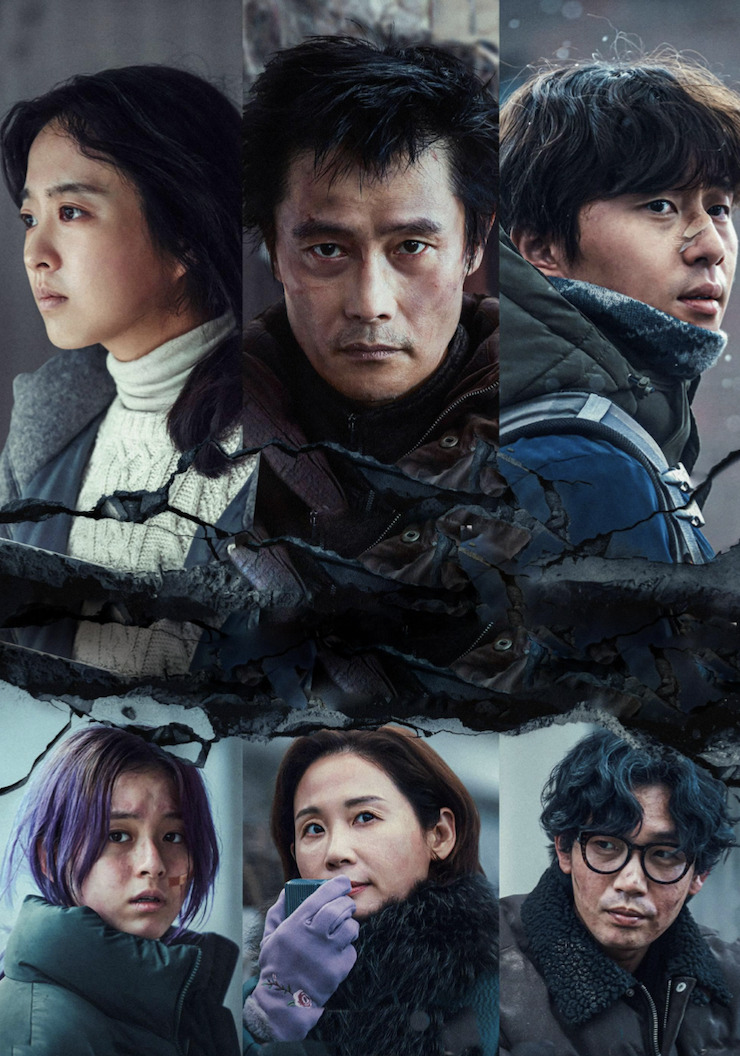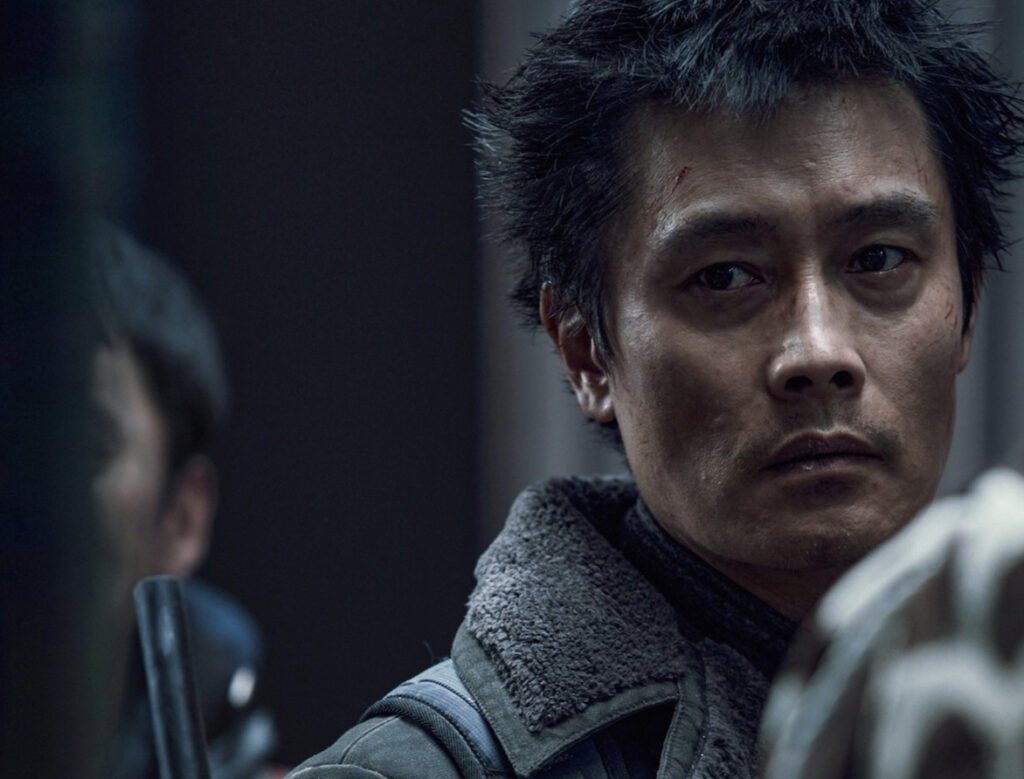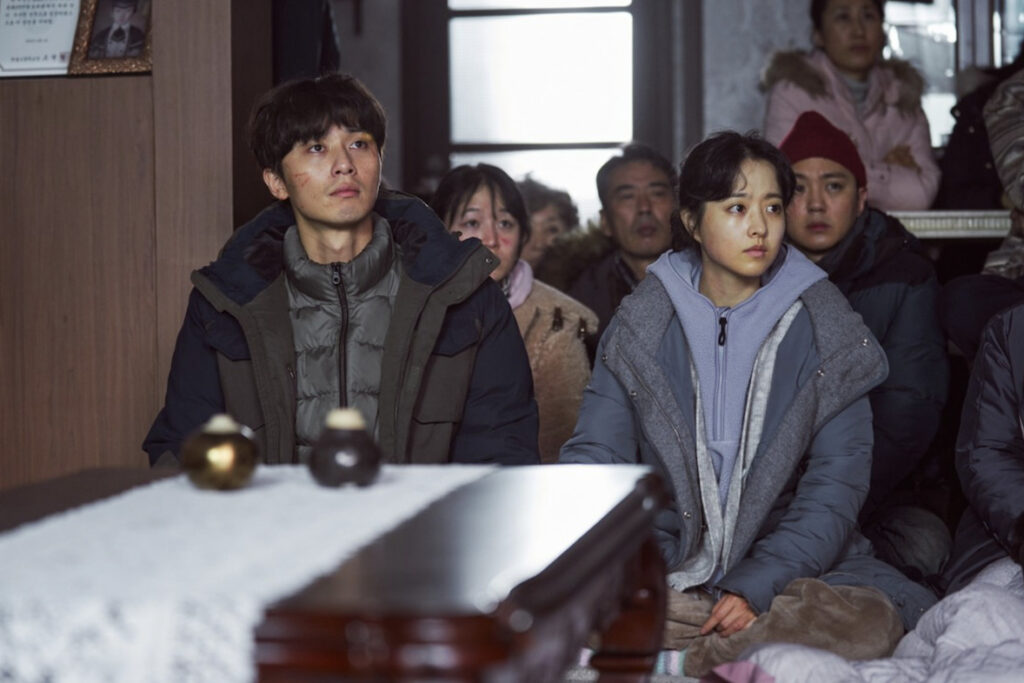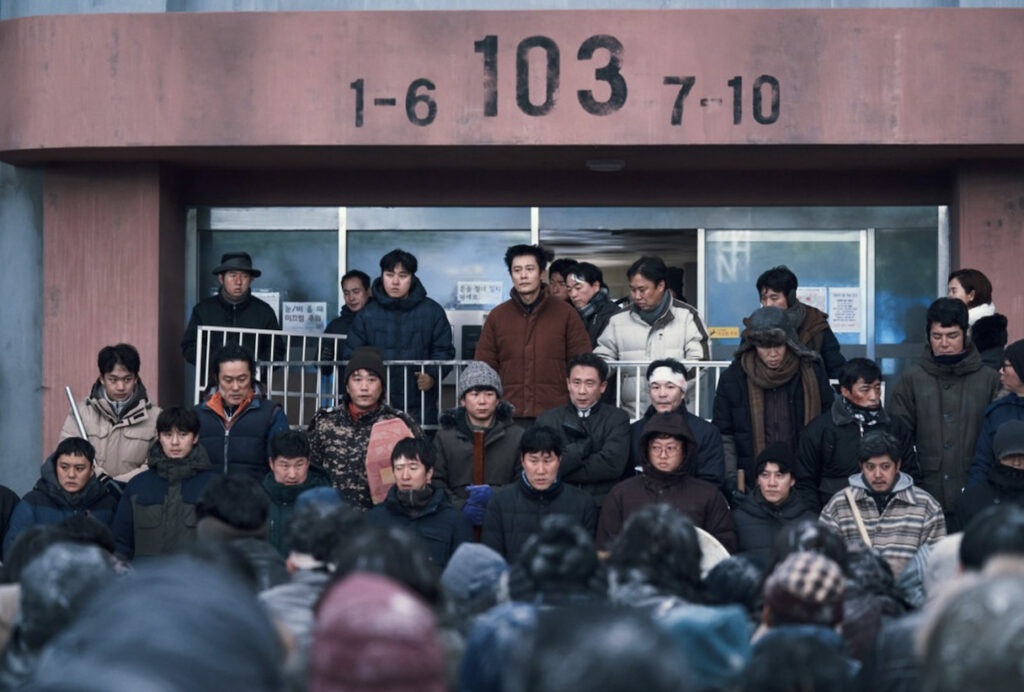
Synopsis : “Concrete Utopia” starts off with a massive earthquake in Korea. While no one knows for sure how far the ruins stretch, or what the cause of the earthquake may be, in the heart of Seoul there is only one apartment building left standing. It is called Hwang Gung Apartments. As time passes, outsiders start coming in to Hwang Gung Apartments trying to escape the extreme cold. Before long, the apartment residents are unable to cope with the increasing numbers. Feeling a threat to their very survival, the residents enact a special measure.
Genre: Drama, Action
Original Language: Korean
Director: Um Tae-hwa
Writer: Um Tae-hwa, Lee Shinji, Jo Seul-yeah
Runtime:
Production Co: Climax Films, BH Entertainment

Exclusive Interview with Director Um Tae-hwa
Q: “Concrete Utopia” is based on the Korean webtoon series, what elements of the series struck a chord with you in order to make this film?
Um Tae-hwa : I was born and raised in an apartment and was always curious as to why we repeatedly keep building the same type of this residence then we demolish it and rebuild it. I was wondering about that and came upon this. There’s only one apartment building that remains. The story actually begins with the survivors gathering towards the apartment. But I was more interested in the background itself and with that [in mind], I wanted to tell a different side of the story.
I decided to adapt the story of apartments on screen and so I started to do some research about the meaning of apartments in Korea. In Korean society, the group mentality is very strong in the country. I think that was a good reason for the country to rapidly develop when it needed to. At the same time, this strong sense of group is like unity. If you don’t comply with this group mentality or if you’re not part of it — if you’re extremely unique — then people reject you in a sense. That aspect also affected this type of dwelling.
Q: This film shows an unprecedented earthquake destroying the Korean peninsula. The same kind of circumstances happened like COVID, the coronavirus. How much of your COVID experience in Korea did you add to this script because it has similar dire circumstances that you have to react to like an outbreak. talk about that — did you add any element that you experienced during the COVID shutdown that you added to the screenplay?
Um Tae-hwa : The script was completed before the pandemic. I didn’t consider the COVID aspect of the film. it just happened to be that the pandemic [occurred] right after it. If you look at the war going on or the refugee problems around the world, all these problems stem from the same problem. There’s a pattern in human behavior that when they face an extreme situation, when people are fearful, they tend to gather and form a group in order to feel like they belong so they can be comforted.
They also elect a leader who’s able to make decisions for them. Anybody who does not belong to the group becomes their enemy. With that, they’re unified under the same group. This is a pattern that you see within human history. Even though I was talking about the apartments in Korea, this aspect coincides with other ideas of human behavior as well.
Q: What does it mean in Korea to own an apartment, particularly a government-owned apartment, like in a complex?
Um Tae-hwa: In Korea, owning an apartment is beyond just owning your own place. It correlates to how you can make ends meet for your family, how you provide for your family. That’s why people become a little obsessed with owning a place and whether you have, whether you own your apartment or own your place or not, that also becomes sort of a standard of how much you can provide for your family.
There are apartments assigned by the government versus brand name apartments. Even within the same school, for example, if a child lives in a government assigned apartment versus the kid who’s from a brand name apartment, their social class divides up in the classroom based on which apartment they live in. It’s definitely a social issue.

Q: You cast two of the biggest Korean stars — Lee Byung-hun and Park Seo-joon Talk about casting them and did you have them in your mind while you were writing the script? Talk about the casting process.
Um Tae-hwa : When I was writing this character, he was definitely someone that I had in mind from being petit bourgeois to being a dictator. It had a huge character arc. I thought about who could actually play this character. He’s definitely one of the actors that a lot of Korean directors like to work with. When I gave him the script, he fortunately said yes. Then we worked on the project together.
As for Park Seo-joon, it’s not that I didn’t consider him, but he happened to read the script first and contacted me. I’m very grateful and feel very lucky. One of the things that I thought was very important was working with these actors. Of course, the realistic expression of the character is very important. I also wanted to show different aspects of these actors that you’ve never seen in any other media or on screen. That’s the conversation that we had a lot. Through makeup and different sizes of camera lenses using different methods, we were trying to show new aspects of these actors.
Q: Was there more of a background story about the character played by Lee Byung-hun? It seems like there was more of a family story in the background.
Um Tae-hwa : Not besides the background that describes the film. In other aspects, this film was a religious metaphor. I brought the story from the Bible, Exodus, and applied it to this story. I wanted to show the satirical aspect of that story. Moses being the Israelites leader and in Exodus, that was the motive of the film. For example, there’s a scene where there’s red paint put across the door frame and blood is being spread on the door frame like in the Bible. All these things are the religious metaphors in the film. Essentially, it’s the story of the false prophet.
Q: Talk about creating the earthquake. Seo-joon drives a car and tries to avoid the actual earthquake — that was really intense. They hang on to their life moments.
Um Tae-hwa: The important factor that I considered in making these disaster scenes was, instead of just being used as entertaining elements, I wanted to make audiences feel the fearful sentiment while watching this scene. In order to do that, I was focusing on Vincent’s facial expression rather than the disaster scenes. Instead of objectively describing the scene, you can watch it unfold from the character’s perspective. You see the character’s face and facial expressions more than the disaster scenes. In certain scenes, the audience can actually imagine what the character is looking at instead of actually looking at the disaster itself. I thought that might be more [expressive], creating more fear among the audience.
Q: This film was not only a commercial success, but also became an entry for the Oscar. What do you think about that achievement?
Um Tae-hwa : I’m very grateful [for that] and am trying to finish off the schedule the best way I can. This is the first experience for me, but instead of being too pressured, I want to enjoy this process as well and do the best I can with whatever I can do.

Check out more of Nobuhiro’s articles.
Here’s the trailer of the film.

